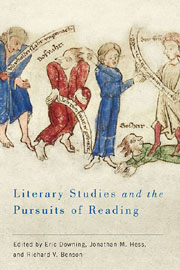Book contents
- Frontmatter
- Contents
- List of Illustrations
- Introduction
- Part I Medieval and Early Modern Practices of Reading
- Part II Reading, Secularization, and Transcendence in the Long Nineteenth Century
- Part III Theories and Practices of Reading in the Twentieth Century and Beyond
- Part IV Postscript: The Ends of Reading
- 12 Reading Experience in Faust
- Works Cited
- Notes on the Contributors
- Index
12 - Reading Experience in Faust
from Part IV - Postscript: The Ends of Reading
Published online by Cambridge University Press: 05 February 2013
- Frontmatter
- Contents
- List of Illustrations
- Introduction
- Part I Medieval and Early Modern Practices of Reading
- Part II Reading, Secularization, and Transcendence in the Long Nineteenth Century
- Part III Theories and Practices of Reading in the Twentieth Century and Beyond
- Part IV Postscript: The Ends of Reading
- 12 Reading Experience in Faust
- Works Cited
- Notes on the Contributors
- Index
Summary
Dear Clayton,
I would like to speak to you about a matter that I hope will interest you very much. Many of your friends—all devotees of your work—have joined hands in this book to celebrate your experience with literature. The matter I have in mind is this very concept of experience, which we students of German literature would expect to find most richly elaborated in Goethe, the very avatar of experience and the idea of experience—and foremost in his “vice-exister,” Faust. I would like to think with you about reading this thing experience in Faust. As we proceed, you will see why I am unable to write, more familiarly, that we will be reading the word “experience” in Faust. Commençons!
Here is the first of three mottoes, in three genres, that preface my remarks. It comes from the Notebooks of Ludwig Wittgenstein:
Earth-thoughts retreat in the face of world-thoughts.… Everything Faustian is alien to me [hence, “earth thoughts” are alien to me]; a thousand questions grow mute in [the face of] redemption. I do not know any doctrines or any heresies.
Hence, for Wittgenstein, Faust's gathering of experience under the aegis of the Earth Spirit amounts neither to “redemption” nor to a doctrine of whatever sort; and here Wittgenstein's literary judgment seems to be one with Faust's own.
My second motto, Taoist in spirit, comes from a self-help tract by the feminist Rita Mae Brown: “Good judgment comes from experience; and often experience comes from bad judgment.”
- Type
- Chapter
- Information
- Literary Studies and the Pursuits of Reading , pp. 251 - 266Publisher: Boydell & BrewerPrint publication year: 2012

